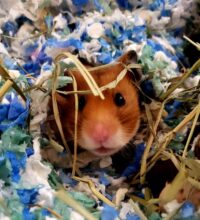Information Box Group

We are a group of individuals working in an animal facility who collectively strive for excellence in animal care. Our goal is to maintain the highest quality animal research facility possible.
We are proud to work in a leading research and medical organization which utilizes animals to improve the quality of life for humans and animals and to gain knowledge and understanding of the sciences.
We are people dedicating our lives to the belief that our knowledge and understanding of our world can improve and advance through animal-based research. At the present time, there are areas for which there are no alternatives to the use of animals.
The Animal Facilities team comply with standards put in place by federal and provincial accrediting bodies, ensuring the humane use of animals in research and teaching.
We endorse and support the doctrine of the three Rs: Replace, Reduce and Refine.
Scientists must adhere to the 3Rs, as developed by Russell and Burch in 1959. They recognized that while the replacement of animals as research subjects was a desirable goal, considerable gains could be made in humane science through reducing the numbers of animals used and refining the techniques that were applied to animals.

Replacement
Replacement refers to methods which avoid or replace the use of animals in an area where they would otherwise have been used.

Reduction
Reduction refers to any strategy that will result in fewer animals being used to obtain sufficient data to answer the research question or in maximizing the information obtained per animal.

Refinement
Refinement refers to the modification of husbandry or experimental procedures to minimize the pain and distress experienced by an animal and to enhance the welfare of an animal used in science.
Over the years, additional Rs have been suggested to be added, such as respect, responsibility and reproducibility.
Respect requires that consideration is given to maintain an acceptable quality of life for animals before, during, and after any scientific activity. This includes adequacy of care and housing, which must be judged relative to their species and reflect their individuality. Ideally, scientific activities should not cause any harm to animals.
We are responsible for those instances where harm to an animal will be unavoidable in achieving the purpose of the research, that the potential harm must be minimized, any residual harm must be justified and positive welfare states are promoted. The use of animals must provide assurance of sufficient benefits to humans, animals or the environment.
It is largely agreed upon that the lack of reproducibility among animal experiments is concerning and, as a result, many efforts have been initiated to improve the way experiments are conducted and reported. The ARRIVE and PREPARE guidelines, which advise on the reporting and planning of animal experiments, respectively, have been adopted by a number of publication bodies and researchers and continues to gain wide acceptance.
